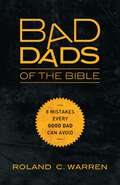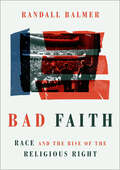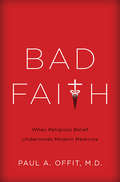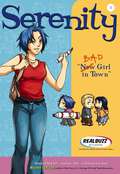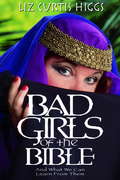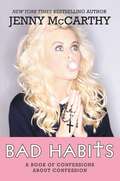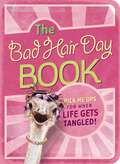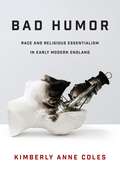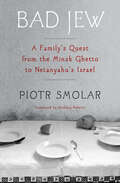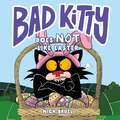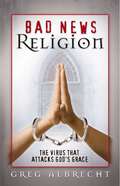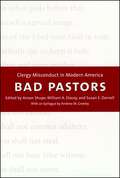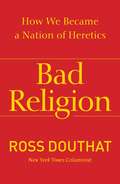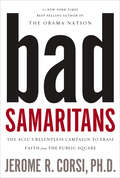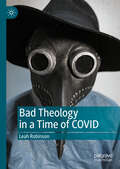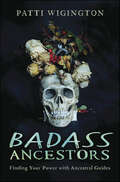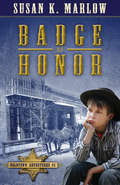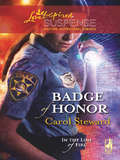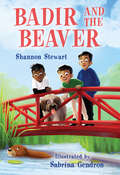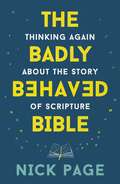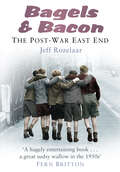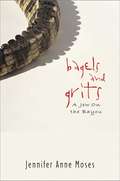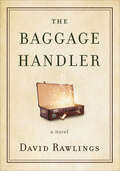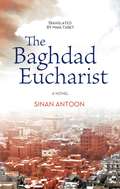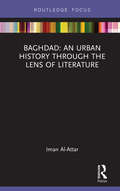- Table View
- List View
Bad Dads of the Bible: 8 Mistakes Every Good Dad Can Avoid
by Roland WarrenSome of the most noted, celebrated and godly men in the Bible made some very big mistakes when it came to raising their children. Roland Warren, President of the National Fatherhood Initiative, calls these errors “bad dad” mistakes. Bad Dads of the Bible examines these mistakes, brings them into a contemporary setting and gives today’s dads much needed advice on how to avoid them. Moreover, should a dad unfortunately make some of these mistakes, this book will give him practical advice and an easy-to-follow roadmap to help him repair his relationships with his children before it’s too late. This book is unique because it brings to life ancient Biblical narratives and stories and creatively illustrates important fathering principles in a way that is sure to engage today’s dads and help them move from inspiration to action. This book also addresses a troubling notion that is held by many pastors and Christian fathers, a notion that has hampered the church’s ability to meet fathers at their point of need. There is a shared perspective and misconception that if we can just help men be better Christians, they will automatically be better dads. In other words, the thinking is that good Christian men will equal good Christian fathers. This certainly sounds logical. But, when you examine the lives of so many men whose stories are chronicled in the Bible, you quickly detected a disturbing pattern. Many of them, even men who had deep and abiding hearts for God, made some rather serious mistakes as fathers that often negatively impacted generations. Therefore, if these fathers had problems, why wouldn’t fathers today? Warren believes that this is why God made sure that these “bad dad” mistakes were front and center, consequences and all, in so many of the Biblical narratives. God truly loves fatherhood and fathers and He wanted these mistakes to be easy to find. Yet, few fathers really take the time to examine them or have strategies to avoid them. Hopefully, as dads study the examples of the fatherhood legacies of men like Abraham, David and Eli, men who loved God deeply, they will learn from their mistakes. More importantly, this book can serve as a clarion call for men to take action now to be the fathers that God designed them to be. There is a saying that a wise man learns from his mistakes. This is true. But the wisest man always learns from the mistakes of others. Each chapter includes Reflection, Correction and Connection sections at the end to help dads easily apply what they have read, as well as a “Good Dad Promise” to pave the way for future good parenting decisions.
Bad Faith: Race and the Rise of the Religious Right
by Randall BalmerA surprising and disturbing origin story There is a commonly accepted story about the rise of the Religious Right in the United States. It goes like this: with righteous fury, American evangelicals entered the political arena as a unified front to fight the legality of abortion after the Supreme Court&’s 1973 Roe v. Wade decision. The problem is this story simply isn&’t true. Largely ambivalent about abortion until the late 1970s, evangelical leaders were first mobilized not by Roe v. Wade but by Green v. Connally, a lesser-known court decision in 1971 that threatened the tax-exempt status of racially discriminatory institutions—of which there were several in the world of Christian education at the time. When the most notorious of these schools, Bob Jones University, had its tax-exempt status revoked in 1976, evangelicalism was galvanized as a political force and brought into the fold of the Republican Party. Only later, when a more palatable issue was needed to cover for what was becoming an increasingly unpopular position following the civil rights era, was the moral crusade against abortion made the central issue of the movement now known as the Religious Right. In this greatly expanded argument from his 2014 Politico article &“The Real Origins of the Religious Right,&” Randall Balmer guides the reader along the convoluted historical trajectory that began with American evangelicalism as a progressive force opposed to slavery, then later an isolated apolitical movement in the mid-twentieth century, all the way through the 2016 election in which 81 percent of white evangelicals coalesced around Donald Trump for president. The pivotal point, Balmer shows, was the period in the late 1970s when American evangelicals turned against Jimmy Carter—despite his being one of their own, a professed &“born-again&” Christian—in favor of the Republican Party, which found it could win their loyalty through the espousal of a single issue. With the implications of this alliance still unfolding, Balmer&’s account uncovers the roots of evangelical watchwords like &“religious freedom&” and &“family values&” while getting to the truth of how this movement began—explaining, in part, what it has become.
Bad Faith: When Religious Belief Undermines Modern Medicine
by Paul A. OffitIn recent years, there have been major outbreaks of whooping cough among children in California, mumps in New York, and measles in Ohio’s Amish country--despite the fact that these are all vaccine-preventable diseases. Although America is the most medically advanced place in the world, many people disregard modern medicine in favor of using their faith to fight life threatening illnesses. Christian Scientists pray for healing instead of going to the doctor, Jehovah’s Witnesses refuse blood transfusions, and ultra-Orthodox Jewish mohels spread herpes by using a primitive ritual to clean the wound. Tragically, children suffer and die every year from treatable diseases, and in most states it is legal for parents to deny their children care for religious reasons. In twenty-first century America, how could this be happening? In Bad Faith, acclaimed physician and author Dr. Paul Offit gives readers a never-before-seen look into the minds of those who choose to medically martyr themselves, or their children, in the name of religion. Offit chronicles the stories of these faithful and their children, whose devastating experiences highlight the tangled relationship between religion and medicine in America. Religious or not, this issue reaches everyone--whether you are seeking treatment at a Catholic hospital or trying to keep your kids safe from diseases spread by their unvaccinated peers. Replete with vivid storytelling and complex, compelling characters, Bad Faith makes a strenuous case that denying medicine to children in the name of religion isn’t just unwise and immoral, but a rejection of the very best aspects of what belief itself has to offer.
Bad Girl in Town (Serenity #1)
by Realbuzz StudiosEveryone needs a little Serenity--or do they?She's only five feet tall and 98 pounds - but she's one tense bundle of attitude and anger. Serenity's life is a mess on every front. Now she's got one last shot at a fresh start . . . but her new school seems to just be adding new problems. Being the "New Kid" isn't making life any easier. But her friends might have just what she's been searching for - if they don't drive her crazy first.
Bad Girls of the Bible: And What We Can Learn from Them (Bad Girls of the Bible)
by Liz Curtis HiggsWomen everywhere marvel at those "good girls" in Scripture-Sarah, Mary, Esther-but on most days, that's not who they see when they look in the mirror. Most women (if they're honest) see the selfishness of Sapphira or the deception of Delilah. They catch of glimpse of Jezebel's take-charge pride or Eve's disastrous disobedience. Like Bathsheba, Herodias, and the rest, today's modern woman is surrounded by temptations, exhausted by the demands of daily living, and burdened by her own desires. So what's a good girl to do? Learn from their lives, says beloved humor writer Liz Curtis Higgs, and by God's grace, choose a better path. In Bad Girls of the Bible, Higgs offers a unique and clear-sighted approach to understanding those "other women" in Scripture, combining a contemporary retelling of their stories with a solid, verse-by-verse study of their mistakes and what lessons women today can learn from them. Whether they were "Bad to the Bone," "Bad for a Season, but Not Forever" or only "Bad for a Moment," these infamous sisters show women how not to handle the challenges of life. With her trademark humor and encouragement, Liz Curtis Higgs teaches us how to avoid their tragic mistakes and joyfully embrace grace.
Bad Habits: A Book of Confessions about Confession
by Jenny MccarthyJenny McCarthy--actress, comedian, activist, and New York Times bestselling author--candidly recounts her humorous Catholic upbringing, from her childhood dream of becoming a nun to her Playmate of the Year centerfold, and all of the Hail Mary's in between.In keeping with the theme of her comedic New York Times bestsellers, from Belly Laughs to Love, Lust & Faking It, McCarthy brings her trademark honesty, humility, and humor to bear as she chronicles her often embarrassing, occasionally outlandish, and always entertaining life as a born-and-raised Catholic girl.Jenny attended one of the most prestigious all-girl Catholic schools in Chicago. While most young girls in Jenny's neighborhood were playing with Cabbage Patch dolls for fun, Jenny was playing with Jesus, Mary, and Joseph dolls. She had every intention of growing up and becoming a nun, but a few hilarious speed bumps and blinking red lights along the way changed her mind. Jenny never did accept Sister Mary's reasoning that she could avoid purgatory if she just bought a string necklace for $10. The fact that two of her aunts are simultaneously nuns and cops-yes, they carry guns and shoot people while wearing a habit-never made complete sense to her. And neither does her mother's insistence that Jenny bury certain religious statues in the front lawns of her houses before she sells them. But then again, Jenny does have four of them buried across Southern California.This book tells the story of what went wrong during Jenny's Catholic upbringing, or, as Jenny puts it now, what went right. Chapters include: "I Knew I Should Have Worn Underwear to Church", "Jesus' Baby Mama", "Can Someone Kill Our Dog, Please?", and "Oh No, My Mom is Going to Hell."BAD HABITS is a brutally honest, hilarious memoir that will delight the legions of Jenny McCarthy fans.
The Bad Hair Day Book: Pick Me Ups For When Life Gets Tangled
by Mark Gilroy CommunicationsWhen life deals you split ends, tangles, limp bangs, and the absolute wrong shade of color, one quick spritz of humor and a comb-through of wisdom from The Bad Hair Day Book will have you smiling again! The wisest man in the world said "a cheerful heart is good medicine," and this book is just what the doctor prescribes. Readers will be encouraged and cheered up with this delightful collection of true life stories, cartoons, poems, Scripture, simple ideas and advice on simplifying and reorganizing life, and other expressions of hope and humor.
Bad Humor: Race and Religious Essentialism in Early Modern England
by Kimberly Anne ColesRace, in the early modern period, is a concept at the crossroads of a set of overlapping concerns of lineage, religion, and nation. In Bad Humor, Kimberly Anne Coles charts how these concerns converged around a pseudoscientific system that confirmed the absolute difference between Protestants and Catholics, guaranteed the noble quality of English blood, and justified English colonial domination.Coles delineates the process whereby religious error, first resident in the body, becomes marked on the skin. Early modern medical theory bound together psyche and soma in mutual influence. By the end of the sixteenth century, there is a general acceptance that the soul's condition, as a consequence of religious belief or its absence, could be manifest in the humoral disposition of the physical body. The history that this book unfolds describes developments in natural philosophy in the early part of the sixteenth century that force a subsequent reconsideration of the interactions of body and soul and that bring medical theory and theological discourse into close, even inextricable, contact. With particular consideration to how these ideas are reflected in texts by Elizabeth Cary, John Donne, Ben Jonson, William Shakespeare, Edmund Spenser, Mary Wroth, and others, Coles reveals how science and religion meet nascent capitalism and colonial endeavor to create a taxonomy of Christians in Black and White.
Bad Jew: A Familys Quest from the Minsk Ghetto to Netanyahus Israel
by Piotr SmolarCombining memoir, history, and political essay, an acclaimed French journalist delves into his family&’s past in this searing, nuanced investigation of Jewish identity and what it means in the diaspora versus Israel today.What is a Jew? There are as many answers as there are Jewish people.Written four years ago, and now available in English with a new introduction, Bad Jew speaks intelligently to our current crises. A striking portrait of the identity fever that has overtaken the Israeli right, and a moving family saga, it follows three generations, three Jewish men, each involved in public life in his own personal way: Piotr Smolar&’s grandfather, a passionate Polish communist, who led the resistance in the Minsk ghetto during World War II; Smolar&’s father, who opposed the communist regime in Poland in 1968 and had to flee the country; and Smolar himself, confronted with the question of Jewish identity after becoming Le Monde&’s correspondent in Jerusalem.Deftly interweaving their stories of activism and migration, Smolar explores how tribalism harms democracy and asks difficult questions: when does loyalty turn into betrayal? What place is left for basic values and empathy? This important book has never been timelier.
Bad Kitty Does Not Like Easter (Bad Kitty)
by Nick BruelAre you ready to find some Easter eggs, Kitty?Kitty doesn’t want an Easter egg. Kitty wants the Easter egg. Kitty wants…the GOLDEN EGG!So she goes on the hunt.There! A blue egg! But Kitty doesn’t want a blue egg.Or there! A purple egg! But Kitty doesn’t want a purple egg.But then…Kitty sees something! Something round…and sparkly…Will Kitty find the GOLDEN EGG?Find out in this uproarious new addition to the New York Times bestselling Bad Kitty series.
Bad News Religion: The Virus that Attacks God's Grace
by Greg AlbrechtFrom any non-Christian point of view, the gospel does not make sense. Grace doesn't make sense. Grace doesn't add up. Why would Jesus come to be one of us, to pay a debt He did not owe, because we owed a debt we could not pay? Why would He do that? Free? No strings? What was in it for Him? Since the church first began, Christians have had trouble accepting God's grace. We have substituted holiness, discipleship, order, regulation, and a long list of things to avoid in place of God's free gift. The result is a "Bad News Religion" that drains the joy and life out of believers.Bad News Religion is a convicting, liberating exploration of how we, in the name of religion, have shifted the focus from the work of God to our ability to become worthy of salvation. The result is bondage and defeat. The key to success in the Christian life is not what we do, but who we know. Knowing God and knowing the fullness of His grace is a liberating experience. Most of us don't realize how we have robbed ourselves of experiencing the richness of God's grace.
Bad Pastors: Clergy Misconduct in Modern America
by Anson Shupe William A. Stacey Susan E. DarnellChild-molesting priests, embezzled church treasures, philandering ministers and rabbis, even church-endorsed pyramid schemes that defraud gullible parishioners of millions of dollars: for the past decade, clergy misconduct has seemed continually to be in the news. Is there something about religious organizations that fosters such misbehavior? Bad Pastors presents a range of new perspectives and solidly grounded data on pastoral abuse, investigating sexual misconduct, financial improprieties, and political and personal abuse of authority. Rather than focusing on individuals who misbehave, the volume investigates whether the foundation for clergy malfeasance is inherent in religious organizations themselves, stemming from hierarchies of power in which trusted leaders have the ability to define reality, control behavior, and even offer or withhold the promise of immortality. Arguing that such phenomena arise out of organizational structures, the contributors do not focus on one particular religion, but rather treat these incidents from an interfaith perspective. Bad Pastors moves beyond individual case studies to consider a broad range of issues surrounding clergy misconduct, from violence against women to the role of charisma and abuse of power in new religious movements. Highlighting similarities between other forms of abuse, such as domestic violence, the volume helps us to conceptualize and understand clergy misconduct in new ways.
Bad Religion: How We Became a Nation of Heretics
by Ross DouthatAs the youngest-ever op-ed columnist for the New York Times, Ross Douthat has emerged as one of the most provocative and influential voices of his generation. In Bad Religion he offers a masterful and hard-hitting account of how American Christianity has gone off the rails—and why it threatens to take American society with it. Writing for an era dominated by recession, gridlock, and fears of American decline, Douthat exposes the spiritual roots of the nation’s political and economic crises. He argues that America’s problem isn’t too much religion, as a growing chorus of atheists have argued; nor is it an intolerant secularism, as many on the Christian right believe. Rather, it’s bad religion: the slow-motion collapse of traditional faith and the rise of a variety of pseudo-Christianities that stroke our egos, indulge our follies, and encourage our worst impulses. These faiths speak from many pulpits—conservative and liberal, political and pop cultural, traditionally religious and fashionably “spiritual”—and many of their preachers claim a Christian warrant. But they are increasingly offering distortions of traditional Christianity—not the real thing. Christianity’s place in American life has increasingly been taken over, not by atheism, Douthat argues, but by heresy: debased versions of Christian faith that breed hubris, greed, and self-absorption. In a story that moves from the 1950s to the age of Obama, he brilliantly charts institutional Christianity’s decline from a vigorous, mainstream, and bipartisan faith—which acted as a “vital center” and the moral force behind the civil rights movement—through the culture wars of the 1960s and 1970s to the polarizing debates of the present day. Ranging from Glenn Beck to Barack Obama, Eat Pray Love to Joel Osteen, and Oprah Winfrey to The Da Vinci Code, Douthat explores how the prosperity gospel’s mantra of “pray and grow rich,” a cult of self-esteem that reduces God to a life coach, and the warring political religions of left and right have crippled the country’s ability to confront our most pressing challenges and accelerated American decline. His urgent call for a revival of traditional Christianity is sure to generate controversy, and it will be vital reading for all those concerned about the imperiled American future.
Bad Samaritans: The ACLU's Relentless Campaign to Erase Faith from the Public Square
by Jerome R. CorsiA battle cry to rise up against the ACLU’s attempts to destroy our freedom of religion—from the #1 New York Times–bestselling author of The Obama Nation.Liberty in America has always depended upon one thing: a citizenry who believes in God. Our founding fathers understood that without faith in God, rights and morality could not last. Without religion, true freedom cannot long endure. So for those who seek to take those rights away, transferring the gifts given by God to the individual back to the control of a secularist state, belief in God is the first tie to be severed.Since the 1920s, a battle has waged across America between radical leftists of the ACLU and those who would keep America true to its inception as “one nation, under God.” Bad Samaritans is bestselling author Jerome Corsi’s explosive look into the history of ACLU and its radical agenda to separate America from its religious roots and remake our nation in its own atheistic image.Told in a straightforward, no-nonsense style, Corsi lays out the history of this struggle, its communist roots, and the court cases that are serving to slowly erode the foundations of our freedom. Today we see the fruits of the ACLU’s master plan—a culture flooded with pornography, placing little worth on the value of a human life, and one in which protection and special treatment seem to exist for everyone except those of a Judeo-Christian background.Bad Samaritans looks behind the headlines and shows the ACLU’s fingerprints as it works to destroy freedom and enslave our constitutional republic to the demands of a Marxist state. It’s time to fight back.
Bad Theology in a Time of COVID
by Leah RobinsonIn this book, Leah E. Robinson discusses the Covid-19 pandemic as it was viewed in the theological community, both professionally and politically. Robinson explores the ways in which the misuse of various Christian theological doctrines have led to and perpetuated social ills. She begins by first defining her criteria for “bad” versus “good” theology, and then investigates the ways in which the handling of the Covid pandemic has provided damaging examples of “bad” theology. The book gives a voice to those who are trying to guide people towards scientific logic and good health, while simultaneously using the lens of Christian leadership.
Badass Ancestors: Finding Your Power with Ancestral Guides
by Patti WigingtonCultivate Relationships with Your People for Empowerment and HealingThis groundbreaking book shows you how to work with different types of ancestors to find, develop, and celebrate the personal power of your inner badass. By embracing the strength of your lineage—both blood relatives and those chosen by the heart—you can receive wisdom and guidance when you need it the most.Badass Ancestors provides a compelling series of rituals, meditations, mantras, and exercises that connect you with ancestral guides. You'll discover advice on genealogy research, the history of ancestor veneration in cultures around the world, ways to deal with problematic ancestors, and how to leave your own legacy for future generations. Each chapter offers unique calls to action—including crafts and recipes—that help you build self-confidence and overall badassery with your ancestors' assistance. When you develop relationships with your relatives and with spiritual or archetypal ancestors, you engage the process of healing trauma and achieving a deep sense of emotional and spiritual well-being.
Badge of Honor
by Susan K. MarlowTwelve-year-old Jeremiah “Jem” Coulter knows that Goldtown, California, has seen the last of the gold rush. But the flecks of gold he and an old prospector, “Strike,” find in their played-out claim on Cripple Creek spur Jem’s hope of striking it rich. In the meantime, he and his sister, Ellie, sell frog legs and firewood to bring in extra cash.When Jem’s father accepts a job as sheriff of lawless Goldtown, Jem is suddenly saddled with an additional responsibility—to run their broken-down ranch. He faces a hard path as he tries to be a man and make his father proud, but then Cripple Creek mysteriously dries up and Strike suddenly disappears. Jem is determined to find out why. Can anything be worse than being a sheriff’s kid? Will outlaws use his father’s badge for target practice? Is that silver star just a target . . . or truly a badge of honor?Readers ages 8 to 14 fell in love with Susan Marlow’s Circle C Adventures. Now the same adventurous spirit and historical lure are back in a brand new series featuring a new cast of characters and exciting escapades. As educational as it is entertaining, the Goldtown Adventures series is one the whole family will enjoy.
Badge of Honor (Love Inspired Suspense #116)
by Carol StewardWhy is experienced FBI agent Sarah Roberts starting over as a small-town beat cop? She has to be working undercover. Stuck with the job of training her, police officer Nick Matthews knows exactly who Sarah is spying on: him. If he ever wants to live down his past, he'll train her well, but won't say one word beyond the manual. Yet it is Sarah's past that comes crashing down on them. And trusting his new partner becomes a matter of life and death--and love.
Badir and the Beaver (Orca Echoes)
by Shannon StewartIt's Ramadan, a time to focus on good deeds and to fast, and Badir and his brother, Anis, are out for a walk one evening while they wait for their iftar meal. In the park Badir sees a rat. A very, very large rat. He soon learns it’s actually a beaver, an animal that doesn't live in Tunisia, the country Badir and his family have emigrated from. It turns out that some of the neighbors who enjoy the park think this beaver is a bit of a pest, but Badir thinks it's wonderful and learns everything he can about the iconic Canadian animal. When a petition is started to remove the beaver, Badir, who knows firsthand how difficult it is to leave your home behind, rallies his classmates to save it. And with a little help from new friends, the kids learn that collaboration and faith can change the way we think about the world. The epub edition of this title is fully accessible.
The Badly Behaved Bible: Thinking again about the story of Scripture
by Nick PageWe're told that the Bible is beautiful, uplifting and a joy to read - but, while we know this is how we're supposed to feel about it, in reality many of us find the very opposite. On opening the Bible, we are faced with a multitude of problems; from its form and historical content to its sheer size and often distasteful stories, we can be left feeling overwhelmed and disheartened. But the problem is not with the Bible - and it's not with us either.The problem is we've been misinformed. And so, we end up believing things about the Bible that the Bible never claims for itself. But the Bible won't politely sign up to the neat categories and terms we force on it. That's why it's badly behaved. We want to control the Bible and tame it so that we can ride it into battle; but the Bible bucks and rears and throws us off. We want to pin the Bible down so that it proves our theology; but the Bible evades capture and plays hide and seek. We want answers; but the Bible keeps firing questions. We want it to tell us what to do; but the Bible keeps telling us to think. We want to make the Bible dance to our tune: but the Bible has music of its own. The Bible is an invitation and a call. The breath of God lifts its pages, and they rise and fall with his breathing.In his honest and accessible style, Nick Page urges us to re-discover a fresh look at the Bible as thescriptural bedrock of the Christian faith, to learn how we can undo unhelpful ways of reading it anddemystifying its purpose and scope.Nick tackles what the Bible is and what it isn't, how we can critically read this inspired text and how we approach the difficulties in its content.Alongside helpful analysis and practical advice - including kickstarting his one-man campaign to ban"Bible study" - Nick helps us re-discover how to rediscover the Bible as Holy Ground, as a place where we meet and encounter God.
Bagels and Bacon: The Post-War East End
by Jeff RozelaarJeff Rozelaar was born into a Jewish family and raised in an East End bombarded by Hitler’s V2s. Fortunate enough to be one of the lucky survivors of the Nazi menace, he was able to play in the streets among the resultant debris with his schoolmates. Jeff spent his formative years in the heart of a truly multicultural community. The streets of East London provided a vivid playground for the youngster; mixing with the many colourful characters and hustlers on Petticoat Lane, taking a job with an uncle as a bookie’s clerk for pocket money and attending the Brady Club – a place for local youngsters to go dancing, play football, and explore the mysteries of the opposite sex. Jeff’s family consisted of Nancy, the proverbial domineering Jewish mother, his somewhat naive father Henry and sister Bernice. Among the wider family circle were numerous quarrelsome aunts, a trio of Communist cousins and the prolifically fertile grandmother Rebecca who lived in a council flat next to a communal rubbish chute. Most of the family were law-abiding citizens, but a few were collared by officialdom, and one by the infamous Krays. This vivid account of growing up is told with passion and humour. The captivating anecdotes within, both poignant and entertaining, are immersed in the sights, sounds and smells of the East End in the post-war era.
Bagels and Grits
by Jennifer Anne MosesWhen Jennifer Anne Moses moved from a comfortable life in East Coast Jewish society to Baton Rouge, Louisiana, she volunteered at an AIDS hospice and rediscovered a profound commitment to her Jewish faith. Outstanding Book, selected by the American Association of School LibrariansBest Books for Regional Special Interests, selected by the Public Library Association
The Baggage Handler: A Novel
by David RawlingsLost luggage can ruin any trip. But what if it could change your life?A mother of three hoping to survive the days at her perfect sister's perfect house before her niece&’s wedding.A hothead businessman coming to the city for a showdown meeting to save his job.A young artist pursuing his father&’s sports dream so he can keep his own alive.When Gillian, David, and Michael each take the wrong suitcase from baggage claim, the airline directs them to retrieve their bags at a mysterious facility in a deserted part of the city. There they meet the enigmatic Baggage Handler, who shows them there's more in their baggage than they've packed, and carrying it with them slows them down in ways they can&’t imagine. And they must deal with it before they can leave.In a similar vein to The Traveler&’s Gift and Dinner with a Perfect Stranger, The Baggage Handler is a modern-day parable about the burdens that weigh us down—and an inspiring invitation to lighten the load.Praise for The Baggage Handler:&“The Baggage Handler is a tale that will resonate deeply with those who have held on too tightly, for too long, to the things hold them captive. That&’s me. That&’s you. Pick it up and prepare to have your world turned upside down, then turned right side up.&” —James L. Rubart, bestselling author of The Man He Never WasA stand-alone, short novel at 42,000 wordsChristy Award winner for Best First Novel of 2019Includes discussion questions for book clubs or Bible study
The Baghdad Eucharist: A Novel
by Sinan Antoon Maia ThabetYoussef and Maha are distant relatives who find themselves living together in their native Baghdad, seeking shelter and solace from the increasing turmoil that surrounds them. While Youssef is old and has lived through many good years, Maha is young and has seen only sanctions and war. Herlife has been shattered by the sectarian violence engulfing Iraq, a country she feels no longer belongs to her.As the chaos in the country inevitably seeps into their household, a rare argument between Maha and Youssef breaks out, as this fateful day takes an unexpected and calamitous turn. Set over 24 hours, The Baghdad Eucharist unravels through the lives of one Christian family; it speaks both to Iraq's peaceful past, as well as its tragic and painful present.
Baghdad: An Urban History through the Lens of Literature (Built Environment City Studies)
by Iman Al-AttarIn recent years, Baghdad has been viewed as a battleground for political conflicts; this interpretation has heavily influenced writings on the city. This book moves away from these perspectives to present an interdisciplinary exploration into the urban history of Baghdad through the lens of literature. It argues that urban literature is an effective complementary source to conventional historiography, using in-depth analysis of texts, poems and historical narratives of non-monumental urban spaces to reveal an underexamined facet of the city’s development. The book focuses on three key themes, spatial, nostalgic and reflective, to offer a new approach to the study of Baghdad’s history, with a view to establishing and informing further strategies for future urban developments. Beginning with the first planned city in the eighth century, it looks at the urban transformations that influenced building trends and architectural styles until the nineteenth century. It will appeal to academics and researchers in interdisciplinary fields such as architecture, urban history, Islamic studies and Arabic literature.
